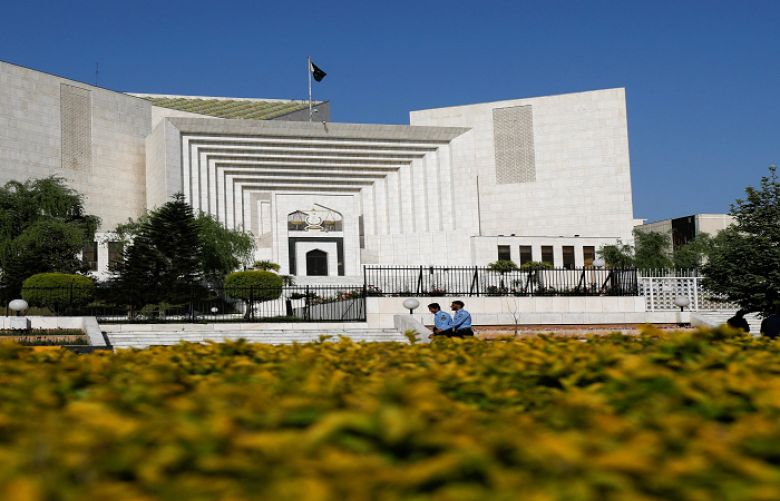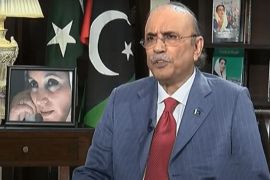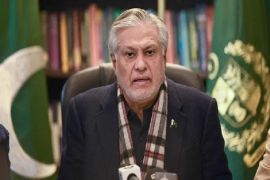A seven-member bench of the Supreme Court of Pakistan head by CJP Umar Ata Banidal on Friday heard petitions filed against civilians trail in military courts.
The cause list of other benches of the Supreme Court is cancelled due to the hearing of the larger bench as three regular benches were scheduled to to hear cases.
The case hearing has been adjourned till Monday (June 26) 9:30am.
The CJP Umar Ata Bandial said that SC wanted to announce the verdict of ‘civilians trial in military courts’ case before Eid holidays.
The Attorney General of Pakistan (AGP) apprised the court that no journalist, minor, woman and lawyer was under custody of Pakistan Armed forced.
He said no person was under custody of Islamabad Capital Territory (ICT) Police.
Attorney General Mansoor Usman Awan giving arguments said that there is no arrested person in the custody of Islamabad (ICT) Police.
He said four people are in custody in Peshawar while 21 people are arrested under MPO in Punjab and 141 people have been arrested under the Anti-Terrorism Act.
The AGP said 172 people are in judicial custody in Sindh and 345 people were arrested and later 70 were released.
He said 117 persons are in judicial custody under MPO and only 102 people are in army custody.
He clarified that no women or minors, journalists and lawyers are in military custody.
Petitioner Chaudhry Aitzaz Ahsan and his lawyer Sardar Latif Khosa while civil society lawyer Faisal Siddiqui reached the Supreme Court. Faisal Siddique has started presenting arguments.
Faisal Siddiqui said his application was different from other applications and he would not argue that a civilian cannot be tried in military courts under the Official Secrets Act.
He said, “A few of the defendants were treated differently. There are 60 accused in an FIR, then 15 are given to military courts.”
Faisal said there may have been three types of trails according to the allegations in the FIRs.
“My second point is about fair trial,” Faisal Siddiqui, adding that, after a trial on a charge some will have the right to appeal and some will not.
He gave reference of the cases of Liaqat Hussain, Saeed Zaman and District Bar Association.
Faisal Siddiqui replied, “Court decisions say that there should be a clear distinction.”
“We do not say that people should not have a tough trial. What tougher trial can be than the Anti-Terrorism Court,” he argued.
-Judges remarks-
Justice Ayesha Malik questioned, “What are the specific circumstances in which a trial in military courts can take place.”
Justice Mansoor Ali Shah said due to national security, it was said that this trial took place in military courts.
Justice Mansoor added, “If they go within the limits of state security, then the trial is mentioned to be in military courts.”
Justice Mazahir Akbar Naqvi questioned when was the Official Secrets Act incorporated.
Justice Yahya Afridi remarked to Faisal Siddique, “You don’t understand that the Attorney General should be asked first about formation.”
Chief Justice of Pakistan Bandial asked lawyer FAisal Siddique to continue his arguments and remarked that court would hear the Attorney General after the lawyers agreements.
“The Attorney General may submit the details which were sought,” the CJP remarked.
Justice Ayesha Malik said, “Maybe the nature of charges against those who were handed over to military courts may be different,” adding that, “You are only saying on assumption that there is no evidence against these people.”
“You are going to a general discussion, it is not even known under which clause these people were sent to military courts,” Justice Yahya Afridi added.
He also asked the lawyer to keep his arguments to the relevant points.
Justice Mansoor Ali Shah said that the law does not say that the official Secrets Act will apply only if there is a person working in the army.
“The Act also applies to the offense of being within military premises,” Justice Mansoor Ali Shah said.
Punjab govt submits data details in SC
According to the report submitted to the court by Advocate General Punjab, 81 women were detained in May 9 incidents, of which 42 were released on bail. While 49 Forty-nine women are currently in jails on judicial remand.
He said arrested orders of 2,250 people were issued under the MPO. 3050 people were found involved in the vandalism incidents of May 9.
Currently, 21 people are imprisoned under the MPO while 1888 people were arrested under the Anti-Terrorism Act.
108 accused are on physical remand and 1240 are on judicial remand.
According to the report, 33 persons were identified under the Anti-Terrorism Act while 500 people were released after declared as innocent.
32 people were released on bail under the Anti-Terrorism Act while 4119 persons were arrested by registering 42 -two cases under other laws, of which 86 on physical remand.
The case hearing adjourned for 15 minutes and later it resumed.
Justice Mansoor Ali Shah inquired what was the method of accusing someone in military courts as Official Secrets Act also applicable to restricted area buildings and some civil buildings.
Justice Mazahir Akbar Naqvi inquired the lawyer of the civil society that he did not come to the basic point.
Justice Naqvi said when were the provisions of the Official Secrets Act added to the FIRs and if the FIRs did not include the provisions of the Official Secrets Act, can the commanding officer seek the extradition of the accused?
“Two questions are being asked to you. You tell the process how the Army Act will be applied. How is the decision reached within the Army that such and such a person is our accused under the Army Act,” Justice Mansoor Ali Shah said.
Chief Justice Umar Ata Bandial said that there should be an inquiry or investigation to impose the Official Secret Act.
“The main thing in the remand of the accused is missing,” Chief Justice remarked, adding that, ’The remand order does not mention how and on what evidence the accused were handed over.“
Justice Ejaz-ul-Ahsan also questioned a complaint under the Official Secrets Act is treated as an FIR.
“The Official Secrets Act is also applicable to civil buildings,” lawyer Faisal Siddiqui apprised the apex court.
-Judges ask process of trial court-
Faisal Siddique said that over May 9 incidents, the remand was sought on May 25 and no reason was given in the FIR, to which, Justice Mansoor Ali Shah replied,
“We will ask about charge before inquiry about the Attorney general of Pakistan.”
Judges ask how did the trial of the civil society start? to which lawyer Faisal Siddique said the process has beknew written in the Army Rules 1954 Sub Section 13.
“You are trying to say that there is apparently no charge against these accused,” Justice Mansoor Ali Shah questioned on which advocate Faisal replied, “I am saying that there should be a strict inquiry before charging.”
He argued, “A civilian government never in history except 1998, conducted a military trial of a civilian.
“If the case was against an army officer, it would have been a different matter, now there is no option other than court martial,” lawyer Faisal Siddiqui argued.
“In the constitutional amendment, a condition was placed on trial in military courts in addition to civilians,” he added.
Justice Mansoor Ali Shah questioned ever happened in history that a trial under the Official Secrets Act was conducted only by a Magistrate? to which, advocate
Fasial replied, “I will present precedents of decisions in this regard.”
The civil society’s lawyer Faisal Siddiqui completed his arguments.
-Justice Jawad S Khawaja’s lawyer Ahmed Hussain agreements-
Justice Jawad S Khawaja’s lawyer Ahmed Hussain came to the rostrum and presented his arguments.
He questioned can civilians—who are not related to the army—be tried in a military court?
“I am of the opinion that in the current situation, a civilian cannot be tried in a military court. Our objection is not that action should not be taken against people. Our point is the forum, not the military courts,” Ahmed Hussain added.
The question is what is the scope of a civilian court martial in the Army Act as the purpose of the Army Act is to keep discipline in the armed forces and Army Act will only apply to those who have been recruited in any company of the armed forces.
Chief Justice Bandial inquired that according to you, “Which fundamental rights of the Constitution will be affected by trial in military courts.”
“The rights given in Article 9, 10 and 25 will be affected,” advocate Ahmed Hussain said.
“21st Constitutional Amendment decision did not prevent 7-member bench from striking down Section 2D-1 of Army Act,” he insisted.
“If the court thinks that its hands are tied after the 21st amendment, then make a full court,” he proposed.
“I would be comfortable in this if the same bench as the bench that gave the decision on the 21st Amendment set up,” Justice Mansoor Ali Shah remarked. “In the 21st constitutional amendment case, the court stated military courts are for specific situations,” Justice Ijaz-ul-Ahsan remarked.
“In this judgment words like war conditions were used,” Justice Ijaz remarked, on which, lawyer Ahmed Hussain said, “I don’t know if the current government is of the opinion that there is a war situation today.”
He said fair trial is a fundamental right of everyone which cannot be denied and pleaded decisions of court martial proceedings are not easily available.
“Who conducts court martial proceedings,” Justice Mansoor Ali Shah inquired, to which Ahmed Hussain replied, “There is a panel that conducts the proceedings.”
“The military court only writes in the verdict that he is guilty or not,” lawyer Ahmed Hussain said.
“Attorney General of Pakistan (AGP) can tell whether the reasons are mentioned in the decision or not.”
“The concept of appeal in military courts is also lies before the army officers and the Army Chief is the final authority in the entire process,” he added.
-Special appeal law made for Indian spy Kulbhushan Yadav-
Ahmed Hussain said a special appeal law was made for Kulbhushan Yadav—who is an Indian spy detained from Balochistan by Pakistani authorities.
He said a law was made for Kulbhushan Yadav to see that the rights obtained in the Vienna Convention were not affected.
“There were no such things as fair trial for citizens in the existing law.” lawyer Ahmed Hussain claimed.
“The Army Act was designed for discipline within the forces,” he said.
Ahmed Hussain contended that senior command of the army drew two conclusions in a press release that military installations were attacked on May 9 and there was irrefutable evidence of the said attack.
“After drawing these conclusions in advance, the Army itself cannot be the judge of this matter,” he maintained.
Ahmed Hussain also gave reference to the Supreme Court judgments of 1975
He said the court can decide on the part of the Army Act that is related to civilians.
“The Army Act is the law related to the army, how will you differentiate,” Justice Mansoor Ali Shah inquired.
“You are saying that the Army Act cannot be judged on the basis of fundamental rights and then you say no, it also talks about civilians, let the court see it,” Justice Mansoor Ali Shah.
Notices to PM, all parties
The Supreme Court had issued a notice to Prime Minister Shehbaz Sharif in this case as a written order was released.
The SC also served notices to the federation, the four provinces, the Attorney General, the Ministry of Interior, the Ministry of Defense, and Pakistan Tehreek-e-Insaf (PTI) chairman Imran Khan.
The apex court also sought details of all people arrested after May 9 arson attacks on state institutions.







